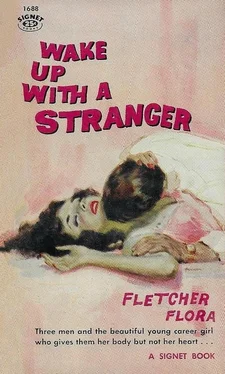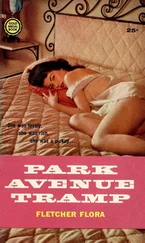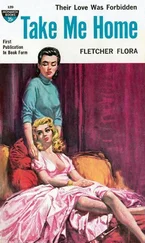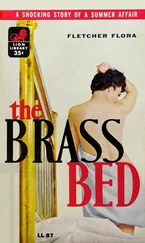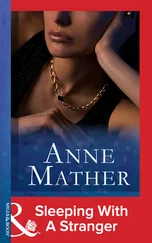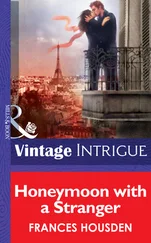“You look exhausted,” he said courteously. “Don’t you think we had better postpone everything for a few days?”
“No. I’m feeling better now, and I want your advice about several things. Tell me again the terms of the will.”
“They’re quite simple. Everything comes to you except the two bequests to Miss Ingram and Miss Buchanan.”
“One thousand to Miss Ingram and ten to Miss Buchanan?”
“That’s right.”
“It’s quite a substantial difference. I wonder why.”
“As I told you, Miss Buchanan is quite a talented young woman. Her original designs have contributed a great deal to the reputation of the shop, and you may remember that she managed the business very competently when Aaron was laid up with his second heart attack. I’m sure the ten thousand is only a kind of bonus in recognition of these services.”
“Which one was she?”
“At the chapel?”
“Yes, of course.”
“The one with glasses. Quite a striking young woman, I think.”
He paid the compliment in malice, but he paid it deftly with the intent and without the appearance. “Can the will be broken?” she asked. “Just the two bequests, you mean?”
“Naturally.”
“No. I can see no possibility at all. Even if there were, I’d hardly advise it. After all, the amount involved is insignificant compared to the total estate. The action would cost too much for so little. Moreover, if you’ll excuse my saying so, I feel that Aaron’s last wishes should be respected.”
“It’s the principle. You know perfectly well what everyone will think when this woman receives such a large amount.”
“Oh, nonsense. I’m sure no one will think anything of the sort. Besides, a court action would certainly be a poor way of detracting attention.”
“All right, I won’t make an issue of it if you think I shouldn’t. I want your opinion on the shop.”
“What about the shop?”
“What would you estimate it is worth?”
“Off hand, it’s impossible to be accurate. I’d guess not less than two hundred thousand dollars as it now stands.”
“Will it be difficult to find a buyer?”
“I shouldn’t think so. Its reputation is superb. Probably has the most desirable patronage in town. However, if you really want my opinion, I advise you not to sell.”
“Why not?”
“The shop is a highly successful enterprise. Nowhere else could you invest your money to receive such large returns.”
“I’m not a business woman. Besides, I am not well. I couldn’t possibly run it.”
“Of course not. You would have to employ a manager who is skilled in that type of business.”
“I wouldn’t even be able to judge the efficiency of a manager. I’d be vulnerable to all sorts of errors and impositions.”
“Do you still want my advice?”
“Certainly. That’s why I asked you to stay.”
“Very well, then. I advise you to keep the shop and to keep Miss Buchanan as its manager.”
“The woman who gets the bequest?”
“That’s right. Donna Buchanan. I know that Aaron had the highest regard for her, and I know from other sources that she’s truly a fine designer. The line of originals she’s initiated compares favorably, I’m told, with the best anywhere, and it’s gaining recognition from women who are willing and able to pay very fancy prices for their original gowns. There’s simply no way to estimate the potential of this kind of enterprise.”
“No. I don’t wish to be encumbered with it. I wish to liquidate all assets and leave this city as soon as possible.”
“Just as you say, of course.”
“Will you handle it for me?”
“Certainly.”
“That’s settled, then.”
“You understand, I hope, that the final settlement of an estate requires time.”
“Oh, yes. Naturally. Just expedite it as much as you can.” She closed her eyes, pressing her fingers upon the lids. “Now I think I had better rest. It has been a difficult day, and I’m really feeling quite ill. Please excuse me for not seeing you out.”
“It’s perfectly all right.”
He stood up. Screened by her lowered lids, he permitted his revulsion to show for a moment in his face. Turning, he walked silently out of the room and downstairs and out of the house.
Behind him, on the lounge in the room where Donna had lately walked with pride in herself and contempt for the room’s owner, Shirley Burns lay quietly with her eyes still closed. She had told for once the truth about herself. She was really quite ill with a functional illness, and the illness was fury and hate.
Her lips moved soundlessly in the shape of an epithet.
From the crematorium chapel, Donna and Gussie walked together to a stop where they caught, after a few minutes, a bus downtown. They got off near the shop and walked from there to a nearby cocktail lounge. Entering it, they sat at a tiny table in a corner. Soft light was admitted through perforations in the patterns of constellations, and on three walls, at intervals, were tapestries of Persian design. They ordered two Martinis. Gussie lifted her fragile glass at once and took a generous swallow. Then she sat for thirty seconds and looked at the olive.
“Well,” she said, “that’s that.”
“Yes, it is,” Donna said, “isn’t it?”
“I’m glad he wasn’t buried,” Gussie said. “What a filthy dismal day it would be to be buried! Do you mind if I’m morbid, darling?”
“Not at all. I’m feeling rather morbid myself.”
“I may even get slightly drunk as well, which would only have the effect of making me more morbid. Would you object to that?”
“Whatever you want to do is all right with me, Gussie.”
“Thank you kindly, Mistress Mary. That’s from a nursery rhyme, you know. That Mistress Mary bit. Do you know why I am thinking of that particular nursery rhyme at this moment? It’s because Mary had a garden, and we have a garden, and the question was and is, how the hell does it grow? Well, not so well, I guess. Ours, that is. The garden surely looks like it’s going to hell, doesn’t it, darling?”
“Maybe not, Gussie.”
“Anyhow, never mind. I’m just a filthy morbid woman, and I wish I were dead instead of Aaron, and that’s the truth. It’s the truth at this time, at any rate, but I admit it may no longer be true tomorrow, or even an hour from now.”
She finished her Martini and signified to the waitress that she wanted a second, but after it was brought she sat looking at it sourly, as if she were not sure that she wanted it after all. It was her second at this sitting, but it was far past her second for the day, and she had gone to the chapel with gin on her breath. Not drunk, nor on the other hand quite sober. Just quietly and bitterly fortified by gin.
“I’m glad he wasn’t buried,” she said again. “It’s much too cold and wet a day to be buried.”
“Why don’t you quit thinking about it?”
“I’d be glad to quit thinking about it if I could, but I can’t. It seems to be something I can’t control at present. Do you know why that is? It’s because I am reminded by association of another person who was put into a hole in a soggy cemetery when I was there, but that was a long time ago, and I was a young girl at the time. This person they put into the hole was a person I was going to marry, but of course after they put him into the hole, it was impossible. His name was Aloysius, which is a name I can’t imagine any mother giving to a child. But I called him Al, and I loved him, and what is truly remarkable is that he loved me too.”
“Don’t say things like that, Gussie. Surely lots of people have loved you.”
“I don’t think so. At least not in the same way as Al. He was a crazy little son-of-a-bitch, to tell the truth, and he insisted on riding a goddamn motorcycle all over the place at simply incredible speeds. I don’t know why he did this, but it seemed as if he had to. Maybe it’s the sort of thing a kid has to do if he’s named Aloysius. Anyhow, he went too fast around a curve on a gravel road, and he hit too much loose gravel or something, and that was the end of him. At least that’s what they figured afterward had happened, and he broke a number of bones, including his neck. It was impossible to patch him up properly for display, so I was unable to see him after it happened, but what I remember most about it now is putting him into a wet hole on a day very much like this one.”
Читать дальше
